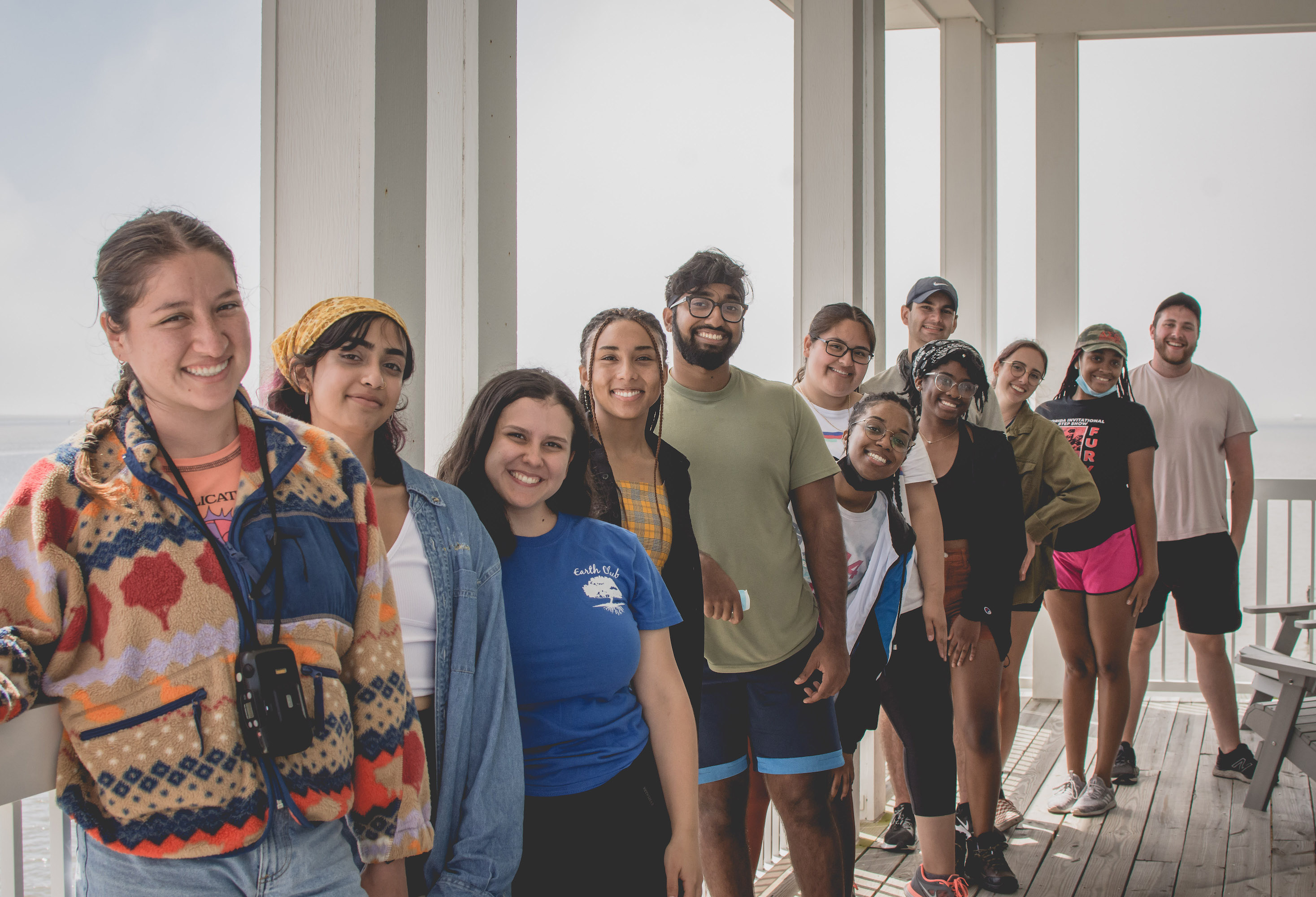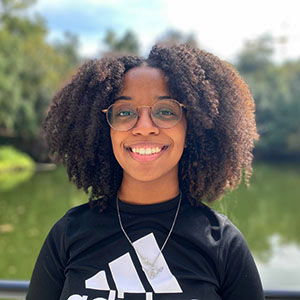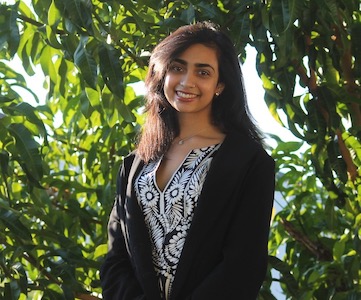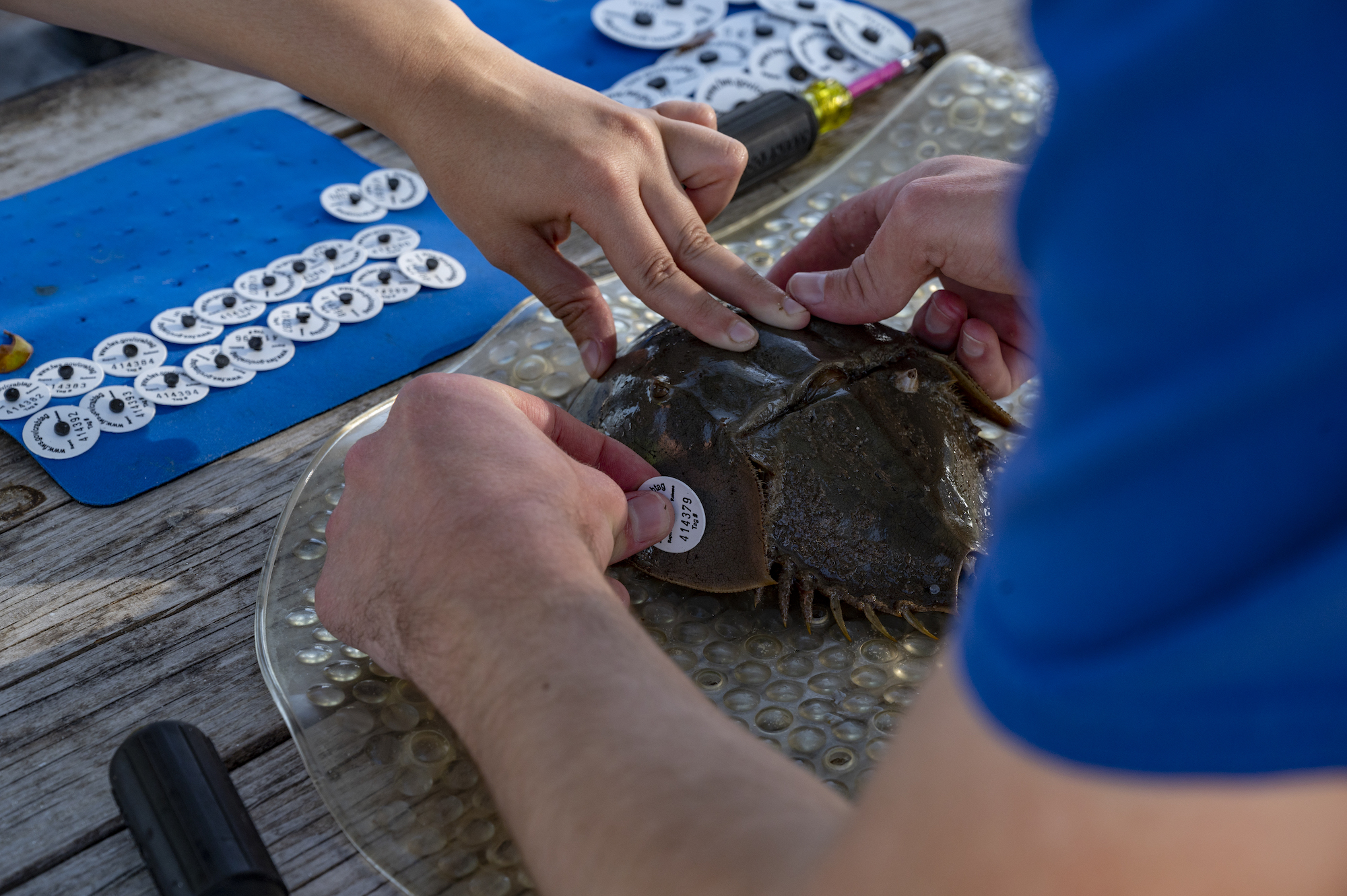Preparing students to take the lead in protecting our planet

Twelve students participated in the first cohort of the Environmental Leaders Fellowship program, shown on a field trip to Cedar Key. Photo Credit: Environmental Leaders Fellowship program, TESI
Welcome to From Florida, a podcast where you’ll learn how minds are connecting, great ideas are colliding and groundbreaking innovations become a reality because of the University of Florida.
Coleen Sailsman and Sarisha Boodoo are among 12 students who participated in the first Environmental Leaders Fellowship program, hosted by the Thompson Earth Systems Institute. They spent spring semester gaining skills that will make them better advocates for our planet. In this episode, Coleen and Sarisha share what they learned about community engagement and environmental advocacy. Produced by Nicci Brown, Brooke Adams and James L. Sullivan. Original music by Daniel Townsend, a doctoral candidate in music composition in the College of the Arts.
Nicci Brown: Welcome to From Florida, where we share stories about the people, research and innovations taking place at the University of Florida. I'm your host, Nicci Brown.
Students at the University of Florida have many opportunities to engage in research, outreach and civic engagement, which is such an important aspect of the educational experience. Today, we are going to highlight just one of the great programs on our campus, the TESI Environmental Leaders Fellowship. This pilot program is hosted by the Thompson Earth Systems Institute — TESI, for short — and it is funded by the Henry David Thoreau Foundation.
Students from all disciplines are invited to apply for a fellowship, during which they participate in seminars, mentoring sessions, a field experience and a community project. During the fellowship, the students learn about protecting the earth and gain the knowledge, skills, confidence and connections to advocate for our planet now and in the future. This year, there were 12 fellows and we are going to talk with two of them — Coleen Sailsman and Sarisha Boodoo. Welcome, Sarisha and Coleen!
Sarisha Boodoo: Hi. Thanks for having us.
Coleen Sailsman: Thank you.
Nicci Brown: It's terrific to have you here. I'd like to hear a little more about you, where you are from and what you are majoring in. Maybe we can start first with you, Sarisha.
Sarisha Boodoo: Yeah, so I am originally from Upstate New York, born and raised in the Catskill Mountains, moved here in 2014, now I'm in Gainesville. I'm a senior studying political science and sustainability studies.
Nicci Brown: And you Coleen?
Coleen Sailsman: Yes. I'm born and raised in South Florida. I'm an environmental science major in my senior year.
Nicci Brown: And why were you interested in the TESI Environmental Leaders Fellowship program, Coleen?
Coleen Sailsman: I never had a lot of exposure to do a lot of activities in the environmental sector. I've had a lot of volunteer experience more in the traditional sense, but as far as going out and actually experiencing the field, I never had an opportunity to do that growing up. So, I thought this would be a perfect chance to get that exposure with people that also enjoy doing such activities. So, it was one of those perfect opportunities that just lighted up my eyes.
Nicci Brown: Terrific. And Sarisha?

Coleen Sailsman. Photo Credit: Coleen Sailsman
Sarisha Boodoo: Yeah. So, I’m in political science so for me, it's kind of difficult to kind of find my position and role within the environmental organization roles. And when I found out about TESI, it just offered this very immersive, very diverse, disciplined background approach for students that didn't have to come specifically from these STEM backgrounds. So, for me, I found out about that and I felt like it was very much tailored to my interest. And one thing that really stood out was also just the inclusivity factor. I feel like a lot of environmental organizations do promote that, but TESI really seemed to really harness a lot of its values in that. So, for me, that definitely captivated me right away.
Nicci Brown: And how did that really support your academic goals? You say political science and there is a tangent, of course, what's discussed in politics and the way we lead and the decisions that are made there are impacts, but how did that really groove with what you had in mind for your academics?
Sarisha Boodoo: Yeah, so policy is definitely one of my major interests. Climate and environmental communication is so important. So TESI really equips us to have the right skills, the knowledge, the confidence to go out there, communicate with people from different communities, different leaders, even younger students, with these ideas of climate and environmental education and communication. And I think for policy, as far as that goes, everyone needs to be involved and everyone needs to understand. So that's where I'm heading in terms of major academic goals and where TESI is going to equip me to harness these strengths to get there.
Nicci Brown: And Coleen?
Coleen Sailsman: Yeah, so similar to Sarisha, actually, I'm also interested in policy. Going through a program, one of the field experiences we will also probably talk about later, was we ended up visiting Cedar Key and in Cedar Key we got to explore some of the different environmental justice issues they are having as well as with their environmental impacts related to climate change. And going through this program, we were able to see a lot of the physical aspects that we could apply to our later careers. So, in attending this program, I actually was able to kind of solidify what I really wanted to do later on as well.
Nicci Brown: And can you tell us about some of the things that you did see when you were in Cedar Key and some of those experiences, just give us a couple of examples.

Sarisha Boodoo. Photo Credit: Sarisha Boodoo
Coleen Sailsman: One of the really cool things that actually happened when we went to Cedar Key is, Cedar Key is a really small city in which they have an older population and then a really large snowbird migrant population as well. The day that we went aligned with a dog fest that they had going on. So, it was actually a really lighthearted day in that sense, but we still got a lot of viewpoints from both visitors and residents that they're seeing impacts in the way that the vegetative landscape was changing. They could see how the tourist industry had been affected or how it actually gained interaction from the COVID pandemic. But we also could see that they did have issues supporting their population with that migrant population, or visitor population, as well.
Nicci Brown: Sarisha, were you part of that visit as well?
Sarisha Boodoo: Yeah. Cedar Key was also a brand-new place for me to visit as well. It was really great. We did some horseshoe crab tagging along the way. For me, I think one thing I really got out of that was just learning about the way solutions are approached from that community standpoint. There's some really great research going on there and it was amazing to see the way the research was implemented in a way where the community was aware of it and it was something that was also benefiting the human aspect as well as the environmental aspect. So, there's a lot of aquaculture stuff going on there, clam and oyster farming as well as one major issue that they have going on there is erosion on their coastal properties. So, there's a lot of mitigation efforts for natural seawalls that help not only just people living there, but also the environment as well as the aquaculture going on there. Instead of using nets, they're using a lot more sustainable practices, which benefit the economy in the long run, as well as the environment.
Nicci Brown: And I would imagine, too, for two people who are looking at policy and may well be shaping our future in terms of those policies, understanding that community connection and how that really impacts the efficacy of these programs must have been very powerful for you both.
Coleen Sailsman: Yes, definitely. I know we got the opportunity to do a lot of community interviews and in doing so we got to hear both sides essentially of the impacts related to the net ban that Sarisha had mentioned, and how they actually saw it being either very positive to the community and how they actually enjoyed that had been implemented to protect the wildlife, but also how it did hinder some fishermen in the area and how it did disrupt the community. But they saw growth and they were able to facilitate that growth through the program such as the living shoreline project or the implementation of the clam industry, I guess.
Nicci Brown: And was this part of the spring break experience?
Sarish Boodoo: Yes.
Nicci Brown: Okay. Were there other field trips that you took on the trip?
Sarisha Boodoo: Yeah. It was the first day when we were at Cedar Key, we visited the Shell Mound. It was this really amazing archeological, natural site of just what, five minutes away from Cedar Key itself?
Coleen Sailsman: Yeah. It wasn't very far and you can tell, but it's also really interesting to see how the landscape changed in between Shell Mound and Cedar Key as well. It was almost two very different environments, but very close together.
Sarisha Boodoo: But yeah, we got to learn some more of the indigenous culture and education behind just the environment, how it was valued, how that environment was utilized. And for us, it was just such a transformative experience, like, I think some of us may have shed a tear or two.
Coleen Sailsman: No, definitely, whatever, our teammates also cried a little bit.
Sarisha Boodoo: A lot of tears, but yeah, that was amazing. We also, oh boy, we went to a lot of places, the Silver Springs Museum, Silver Springs itself. We did some kayaking around.
Nicci Brown: The program does bring together those students who have very diverse backgrounds and fields of study and has that been part of the power of this whole experience for you?
Coleen Sailsman: I would say it definitely has. Being able to not only meet people from different majors who are also interested in sustainability like Sarisha, although she is a sustainability major. She has a very large grasp on the concept of sustainability and how it applies to her own interests, which is something you could see with a lot of our other fellows as well. We had a data scientist, we had zoology major and even, I think, some other communication majors as well, which was interesting to see how they intertwine in the field and also how you can really apply that to your future careers. It was a very impactful experience because you got to get those different perspectives from the fellows, as well as all the other people on the field that we were able to meet.

During a field trip to Cedar Key, students helped tag horseshoe crabs. Photo Credit: TESI/UF
Nicci Brown: Was there anything surprising that you learned from your fellow fellows?
Sarisha Boodoo: Well, for one thing, earth systems is about the interconnection of all these chemical, physical, biological process that impact things very differently. And with that being said, you do need a very broad discipline of studies being approached to these topics. So for me, I'm very rooted in the very human side of the environment — policy, even some of the anthropological, we had one or two anthropology majors, I believe. But also for me just learning about the whole STEM background.
So we had some people that were zoology and I think marine sciences as well. I'll admit sometimes those topics are a little intimidating for someone that doesn't have much of this very STEM scientific background, especially when it comes to the language and the communication behind it. A lot of these words can just seem to kind of go over my head every now and then but being around these fellows that were willing to take the time, explain it to you. For me, I realized that everyone may have a different discipline, but at the end of the day, it benefits us all and it strengthens what we're studying and we're able to apply that in our own ways.
Nicci Brown: And what about your final projects that you took part in with community partners? Maybe Coleen, you can tell us a little bit about that as well.
Coleen Sailsman: Yeah, for my community project, I'm working with a team to develop a survey that measures student engagement with the climate action plan 2.0 on campus, through the Office Sustainability. We found that it's a very integrated process in which they do publish a lot of their information as they go, however, not a lot of students know about it. So, we wanted to kind of engage students, see like what they know about it, where they are in the process, if they've even participated with it, and give that information back to the Office of Sustainability so they can use it in their future studies as well. We just released our survey. So it's actually live right now if anyone wants to do it.
Nicci Brown: Where can they find that survey if they want to participate?
Coleen Sailsman: We are actually in the process of putting some survey flyers up around campus with a QR code. So, if anybody's listening to this, we're trying to put one in Library West, there's going to be one in the IVC, in Lacacita, and as well as some other places around campus. So if you see it, whip out your phone, do the QR code, it's just less than five minutes.
Nicci Brown: Fantastic. And is it primarily for students or is it for the entire community?
Coleen Sailsman: It's for mostly the UF community to engage their process in the program’s initiative.
Nicci Brown: Great. And Sarisha, your final project?
Sarisha Boodoo: Yeah, so I'm working on a K through 12 educational outreach program, actually. So we are actually creating a set of educational videos, lesson plans and resources and materials to assist. Teachers can use them, but also homeschooled children, tutoring programs. For us, we're focusing on the Florida aquifer and coastal Marine processes. So, for me, the extent of my video is focused on the geological formations of these Florida aquifers. That's a really important thing when harnessing environmental stewardship and the value of these systems, because just starting about the very intricate, historical processes that led to the way we're getting our drinking water, we just turn on a tap, it's there. But when you learn about just all these vast systems that created this, to me, it brings up so much of importance. So we're creating these lessons to foster in a whole generation of scientists, educators, policy makers, if you will, starting them off young.
Nicci Brown: And I think we touched on this a little bit, but can you tell us more about how this program might have given you a new focus or maybe crystallized the plans that you already had, and maybe we'll start with you Sarisha and then Coleen.
Sarisha Boodoo: Education is something I've always thought about, obviously, because I feel like that equips everyone to be better communicators. When you are very confident with the topic, the best way to approach that is through education. So for me, it's figuring out what exactly I wanted to do in education. That was the next step. But being with TESI, I figured out I'm not limited, there are so many other routes. Environmental education that's something I've been kind of scared to approach because it's not within my field of study, but now having some experience with that, it's definitely something I'm interested in. Even museum education, like being in the Florida museum and also the Silver Springs Museum as well.
Just seeing the way it's so immersive and engaging, museum education is something that has also sparked my interest. And then policy as always, I think, is something, it's always been on my agenda, but I feel like I'm really interested in the ways in which we approach policy. So going back to that social and community aspect, figuring out what policy is best for certain communities. I really do enjoy that aspect of going out into these communities, talking to them, engaging yourself, becoming a part of that community and finding out what's best for them. Because if we have policy makers writing these policies behind their desk, without going into these communities, we're not going to find these effective solutions. So, for me that's something that I've really enjoyed.
Nicci Brown: And Coleen?
Coleen Sailsman: Yeah. So similar to Sarisha, I've also always had an interest in the educational side. Prior to this experience, I've had interest in education, more in the traditional aspect of being in the school system K through 12, but I realized over time, it's not necessarily something that interests me in any further. I would like to practice education through outreach more so. And going through the program, especially one of the first days when we're in Cedar Key, we were able to immerse ourselves with one of the extension offices in Cedar Key and getting that experience and seeing what they can do, seeing that you can work with outreach, but also you can work with research as well and develop solutions actively in your community — it was something that I was very interested in doing. I will say that the program didn't necessarily change what I wanted to do. It did help crystallize it though in the future. I see more opportunities in how I can integrate my interest into different options later on, though, it definitely was a completely immersive and beneficial experience.
Nicci Brown: Well, it'll be terrific to see what you both achieve in the future. I have no doubt there are big things coming. Thank you so much, Sarisha and Coleen, for joining us today.
Sarisha Boodoo: Thank you. It's been a pleasure.
Coleen Sailsman: Thank you for having us.
Nicci Brown: Listeners, thank you for joining us for another episode of from Florida. Our executive producer is Brooke Adams and our technical producer is James Sullivan. I'm your host, Nicci Brown, and I hope you'll join us next time.
